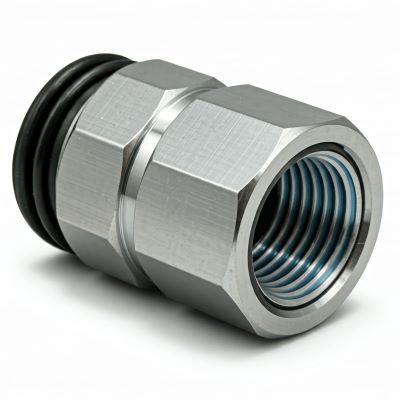SAE O-ring boss fittings are renowned for their durability, reliability, and leak-proof performance. These fittings are widely used in various industries due to their superior design and construction. In this blog post, we’ll delve into the reasons why SAE O-ring boss fittings are the go-to choice for long-lasting, trouble-free connections.
What Are SAE O-Ring Boss Fittings?
SAE, or the Society of Automotive Engineers, sets industry standards for automotive and aerospace engineering. SAE O-ring boss fittings are designed to specific SAE standards, ensuring compatibility and performance. The “O-ring boss” refers to a raised area on the fitting that houses an O-ring, creating a tight seal when mated with another fitting.
The O-ring design is a key factor in the durability of SAE O-ring boss fittings. The O-ring compresses between the mating surfaces, creating a leak-proof seal. The design also allows for easy assembly and disassembly, minimizing the risk of damage to the fittings. High-pressure resistance is another crucial aspect of SAE O-ring boss fittings. The materials used in their construction, such as steel and stainless steel, are designed to withstand high pressures without compromising the integrity of the seal.
Advantages of SAE O-Ring Boss Fittings
➡️ Leak-Proof Performance: The O-ring design ensures a tight seal, preventing fluid leakage and contamination.
➡️ Durability: The robust construction and high-quality materials make these fittings highly durable.
➡️ Ease of Installation: The straightforward design makes installation quick and uncomplicated.
➡️ Cost-Effective: Fewer leaks and replacements can lead to significant cost savings over time.
Common Applications for SAE O-Ring Boss Fittings
SAE O-ring boss fittings are used in a wide range of applications, including:
➡️ Heavy Machinery: Tractors, excavators, and other construction equipment
➡️ Industrial Systems: Hydraulic presses, pumps, and automated equipment
➡️ Aerospace and Automotive: Fuel, brake, and air systems
How to Choose the Right SAE O-Ring Boss Fitting
When selecting an SAE O-ring boss fitting, consider the following factors:
➡️ Size: Choose the appropriate size to match your piping or tubing.
➡️ Material: Select a material that is compatible with the fluid being used and the operating environment.
➡️ Pressure Rating: Ensure the fitting can withstand the maximum pressure in your system.
Installation Tips for a Perfect Seal with SAE ORB Fittings
➡️ Cleanliness: Clean the threads and mating surfaces before installation.
➡️ Lubrication: Apply a suitable lubricant to the O-ring to ensure smooth installation and prevent damage.
➡️ Tightening: Tighten the fittings to the specified torque to achieve a secure seal without over-tightening.
Maintenance and Troubleshooting for SAE O-Ring Boss Fittings
➡️ Regular Inspection: Inspect the fittings for signs of wear, damage, or leaks.
➡️ O-Ring Replacement: Replace worn or damaged O-rings promptly.
➡️ Cleaning: Clean the fittings regularly to remove dirt and debris.
➡️ Leak Troubleshooting: If a leak occurs, check the O-ring, the fitting threads, and the mating surfaces.
Explore these other resources to widen your knowledge ⬇️⬇️⬇️
Boss O Ring Kit 101: Everything You Need to Know
Coupling Quick Release: The Fast, Secure Connection Solution
Why SAE ORB Fittings Are the Go-To Choice for Longevity
SAE O-ring boss fittings are the preferred choice for many industries due to their durability, reliability, and ease of use. Long-lasting performance is ensured by their excellent design and construction, which also reduces maintenance expenses and downtime.
By understanding the benefits and proper use of SAE O-ring boss fittings, you can make informed decisions to optimize your systems and reduce operational costs.
Post time: Nov-12-2024


